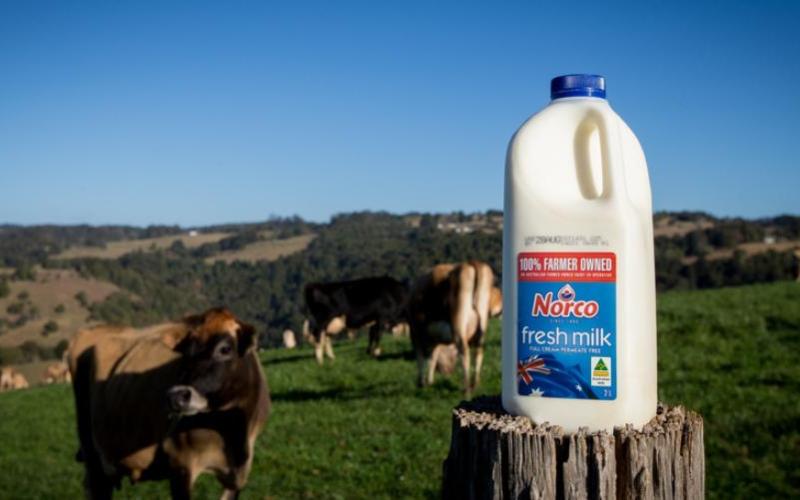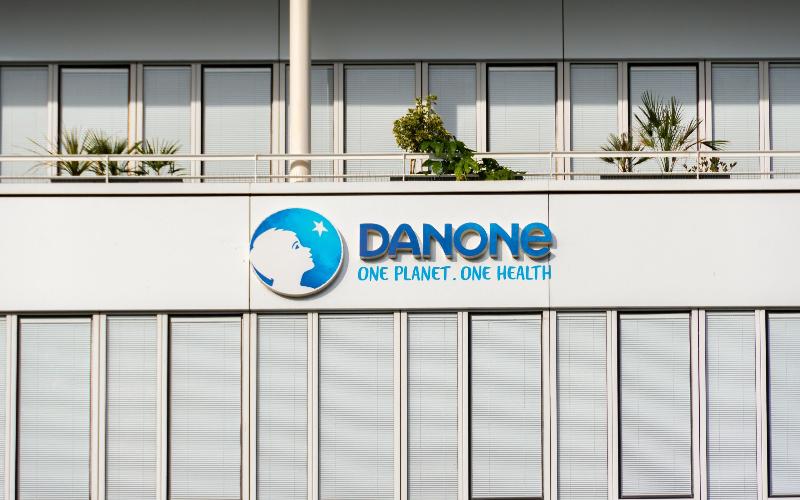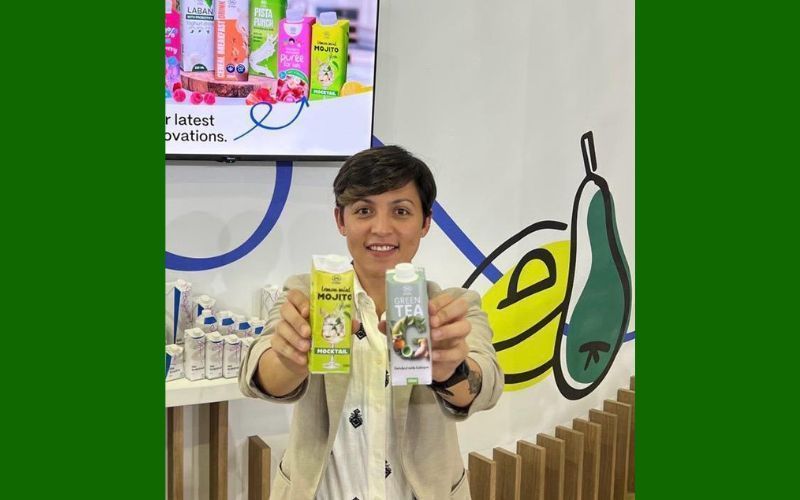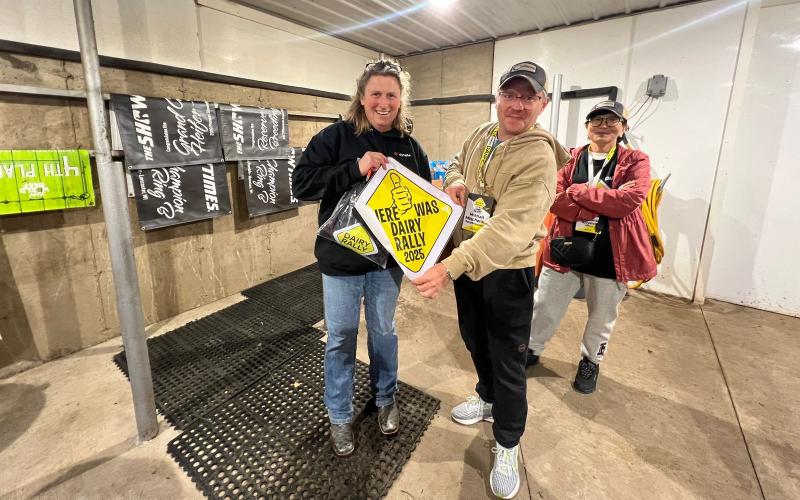Interview with Amos Palfreyman, Co-Founder & CEO, Miruku
Source: The DairyNews
We talked about alternative milk protein with Amos Palfreyman, Co-Founder & CEO, Miruku.

Plants producing dairy protein without the cow is really something new. Please tell us a little bit more about your technology. How did you come to this?
Miruku is a biofoodtech start-up that aims to produce dairy directly in plants, without the cow.
We are using genetic technologies to modify safflower to produce dairy proteins and modified fats, stored in the seeds. The seeds will be grown, harvested, and simply processed into a portfolio of ingredients (protein powders, fats, emulsions) all using existing infrastructure. Our crops fit into various crop rotations, provide improved biodiversity and climate resilience, and will enable delicious, affordable, sustainable animal-free foods and beverages.
This journey began with an ambition to create more sustainable food production methods. Recognizing the environmental challenges associated with traditional animal dairy production—such as high water usage, land degradation, and greenhouse gas emissions—we sought an alternative that could offer the functional and nutritional benefits of dairy without the environmental footprint.
You describe your technology as climate-friendly. Why do you claim that? Is there any objective data to support this?
We consider our technology climate-friendly because it leverages the efficiency of plants to produce dairy proteins and fats, bypassing the environmental footprint associated with traditional dairy farming. The well-documented sustainability of plant-based diets, as highlighted in the Planetary Health Diet by Willett et al. (Lancet, 2019), supports our approach. By using photosynthesis, we eliminate the inefficiencies and emissions fr om the process of cows consuming plants to produce milk.
We've chosen safflower as our initial crop due to its drought resilience, soil-improving qualities, and versatility in different geographies and crop rotations. Traditionally, farmers grew safflower for its agronomic benefits despite low financial returns. Miruku aims to transform safflower into a valuable crop, offering both environmental and economic benefits to farmers.
At this stage we do not have formal data available, we are planning to undertake a lifecycle analysis (LCA) within the next 18 months. Our internal preliminary assessment suggest that Miruku's method could halve the emissions compared to traditional animal dairy production
Does your technology have any limits? Please tell us about them. What are the main challenges for you right now?
I think it would be fair to say that every technology has limits!
Currently, one of the significant challenges we face is the inherent time it takes to work with plants. Unlike yeasts and bacteria, which can grow rapidly and produce protein samples quickly, our approach takes more time initially. However, once we've established our modified plants and produced the initial seeds, scaling up can be done quite swiftly due to the use of existing infrastructure. This is a significant advantage over the precision fermentation approaches, which are currently finding scale-up more challenging than many expected.
Navigating regulatory approvals in various markets is another hurdle. We're proactively engaging with regulatory bodies and feel positive about securing the necessary licenses. Yet, certainty will only come once these approvals are officially granted.
Our R&D team is also faced with the dilemma of prioritizing targets. There's a vast array of different molecules we would like to produce in our plants. As a startup, our focus must be on launching our first product successfully, but we're excited about the endless possibilities this technology holds and are constantly adding new ideas for future projects into our pipeline.
Who is your customer? Describe which categories of customers you primarily target?
Miruku primarily targets food manufacturers as our direct customers. These manufacturers will use our ingredients to create delicious products, catering to their specific consumer bases. Our business-to-business (B2B) approach allows us to rapidly expand our reach, impacting a broader consumer market more effectively than if we were to launch consumer products directly.
Our current partners range fr om small enterprises to global multinationals, reflecting the diverse interest in our products. These companies are spread across the globe and operate in various segments of the food industry. This diversity underscores the versatility of Miruku ingredients, which can substitute for animal dairy in a myriad of product categories.
While it's still early to pinpoint the first product to market with our ingredients, we're excited about the prototypes we've developed, including versions of cheese and whipped cream. These developments hint at the vast potential for Miruku's ingredients across different food and beverage applications.
How do you see the future of the dairy industry in the medium and long term? Will technologies like yours replace traditional milk production completely or will it be a coexistence of two worlds?
In envisioning the future of the dairy industry, both in the medium and long term, we anticipate a coexistence between traditional animal dairy and Miruku dairy. Our technology isn't about replacing traditional milk production entirely but rather complementing it by offering sustainable alternatives to some of the key dairy-based ingredients.
We believe that animal dairy should be reserved for instances wh ere it's the "hero" ingredient, like artisanal cheeses and premium ice creams. In contrast, Miruku dairy is ideally suited for use in products wh ere dairy plays a supporting role, enhancing taste and texture without being the main focus. This approach not only diversifies the dairy industry but also addresses sustainability concerns by providing alternatives that reduce the environmental footprint.
This coexistence strategy allows us to preserve the cultural and culinary heritage of traditional dairy while embracing innovative solutions that meet the growing demand for sustainable food production. Ultimately, the goal is to balance tradition with innovation, ensuring that we can continue to enjoy dairy in a way that's better for the planet.
Tell us about your business model. How do you see your technology scaling?
Miruku operates on a business-to-business (B2B) model, focusing our expertise on the development and validation of innovative germplasm. Rather than building our own infrastructure for growing or processing, we will partner with established players across the supply chain to produce and distribute our ingredients.
A key strength of our technology lies in its scalability. We will leverage the existing agricultural and processing infrastructure, which enables us to quickly and efficiently scale up production. This approach not only simplifies the process of bringing our products to market but also facilitates swift expansion following our launch, ensuring that we can meet demand and explore new opportunities rapidly.
Earlier we wrote: Miruku Secures $5 Million in Funding as Plant-Based Dairy Tech Reaches Key Milestones
Miruku is a biofoodtech start-up that aims to produce dairy directly in plants, without the cow.
We are using genetic technologies to modify safflower to produce dairy proteins and modified fats, stored in the seeds. The seeds will be grown, harvested, and simply processed into a portfolio of ingredients (protein powders, fats, emulsions) all using existing infrastructure. Our crops fit into various crop rotations, provide improved biodiversity and climate resilience, and will enable delicious, affordable, sustainable animal-free foods and beverages.
This journey began with an ambition to create more sustainable food production methods. Recognizing the environmental challenges associated with traditional animal dairy production—such as high water usage, land degradation, and greenhouse gas emissions—we sought an alternative that could offer the functional and nutritional benefits of dairy without the environmental footprint.
You describe your technology as climate-friendly. Why do you claim that? Is there any objective data to support this?
We consider our technology climate-friendly because it leverages the efficiency of plants to produce dairy proteins and fats, bypassing the environmental footprint associated with traditional dairy farming. The well-documented sustainability of plant-based diets, as highlighted in the Planetary Health Diet by Willett et al. (Lancet, 2019), supports our approach. By using photosynthesis, we eliminate the inefficiencies and emissions fr om the process of cows consuming plants to produce milk.
We've chosen safflower as our initial crop due to its drought resilience, soil-improving qualities, and versatility in different geographies and crop rotations. Traditionally, farmers grew safflower for its agronomic benefits despite low financial returns. Miruku aims to transform safflower into a valuable crop, offering both environmental and economic benefits to farmers.
At this stage we do not have formal data available, we are planning to undertake a lifecycle analysis (LCA) within the next 18 months. Our internal preliminary assessment suggest that Miruku's method could halve the emissions compared to traditional animal dairy production
Does your technology have any limits? Please tell us about them. What are the main challenges for you right now?
I think it would be fair to say that every technology has limits!
Currently, one of the significant challenges we face is the inherent time it takes to work with plants. Unlike yeasts and bacteria, which can grow rapidly and produce protein samples quickly, our approach takes more time initially. However, once we've established our modified plants and produced the initial seeds, scaling up can be done quite swiftly due to the use of existing infrastructure. This is a significant advantage over the precision fermentation approaches, which are currently finding scale-up more challenging than many expected.
Navigating regulatory approvals in various markets is another hurdle. We're proactively engaging with regulatory bodies and feel positive about securing the necessary licenses. Yet, certainty will only come once these approvals are officially granted.
Our R&D team is also faced with the dilemma of prioritizing targets. There's a vast array of different molecules we would like to produce in our plants. As a startup, our focus must be on launching our first product successfully, but we're excited about the endless possibilities this technology holds and are constantly adding new ideas for future projects into our pipeline.
Who is your customer? Describe which categories of customers you primarily target?
Miruku primarily targets food manufacturers as our direct customers. These manufacturers will use our ingredients to create delicious products, catering to their specific consumer bases. Our business-to-business (B2B) approach allows us to rapidly expand our reach, impacting a broader consumer market more effectively than if we were to launch consumer products directly.
Our current partners range fr om small enterprises to global multinationals, reflecting the diverse interest in our products. These companies are spread across the globe and operate in various segments of the food industry. This diversity underscores the versatility of Miruku ingredients, which can substitute for animal dairy in a myriad of product categories.
While it's still early to pinpoint the first product to market with our ingredients, we're excited about the prototypes we've developed, including versions of cheese and whipped cream. These developments hint at the vast potential for Miruku's ingredients across different food and beverage applications.
How do you see the future of the dairy industry in the medium and long term? Will technologies like yours replace traditional milk production completely or will it be a coexistence of two worlds?
In envisioning the future of the dairy industry, both in the medium and long term, we anticipate a coexistence between traditional animal dairy and Miruku dairy. Our technology isn't about replacing traditional milk production entirely but rather complementing it by offering sustainable alternatives to some of the key dairy-based ingredients.
We believe that animal dairy should be reserved for instances wh ere it's the "hero" ingredient, like artisanal cheeses and premium ice creams. In contrast, Miruku dairy is ideally suited for use in products wh ere dairy plays a supporting role, enhancing taste and texture without being the main focus. This approach not only diversifies the dairy industry but also addresses sustainability concerns by providing alternatives that reduce the environmental footprint.
This coexistence strategy allows us to preserve the cultural and culinary heritage of traditional dairy while embracing innovative solutions that meet the growing demand for sustainable food production. Ultimately, the goal is to balance tradition with innovation, ensuring that we can continue to enjoy dairy in a way that's better for the planet.
Tell us about your business model. How do you see your technology scaling?
Miruku operates on a business-to-business (B2B) model, focusing our expertise on the development and validation of innovative germplasm. Rather than building our own infrastructure for growing or processing, we will partner with established players across the supply chain to produce and distribute our ingredients.
A key strength of our technology lies in its scalability. We will leverage the existing agricultural and processing infrastructure, which enables us to quickly and efficiently scale up production. This approach not only simplifies the process of bringing our products to market but also facilitates swift expansion following our launch, ensuring that we can meet demand and explore new opportunities rapidly.
Earlier we wrote: Miruku Secures $5 Million in Funding as Plant-Based Dairy Tech Reaches Key Milestones
Key News of the Week














